|
www.HearingDirectory.ca |
Hearing aid batteries: what you need to know
By Shantelle Shakes, BA (Hons)., Hearing Health Information Coordinator, Hearing Directory Last updated on: February 28th, 2025 A look at the pros and cons of the two types of hearing aid batteries, and how to care for either type. Key points:
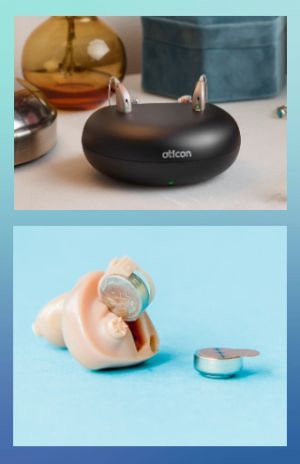
hearing aids with disposable batteries (bottom). When selecting hearing aids, the type of battery is an important consideration. There are two main types: rechargeable and disposable hearing aid batteries. Each one has pros and cons, depending on your type of hearing loss, lifestyle and preferences. Below, we look at both types and how to take care of either kind of hearing aid battery. How long do hearing aid batteries last?Disposable hearing aid batteries can last three to 10 days depending on the size of the battery. Most rechargeable hearing aid batteries are made of lithium ion. This kind of battery can provide up to a full day of use, with one to four hours of streaming, on a full charge. They will need three to four hours of charging to provide a full charge. If you forget to charge them, a quick 30-minute charging period will provide another six hours of use. You can charge rechargeable hearing aids in four simple steps:
Rechargeable hearing aid batteriesMost hearing aids sold today come with rechargeable batteries that are not removable. These hearing aids are generally best-suited for people with mild-to-moderate hearing loss, and they almost always come in a behind-the-ear style. Here are some common advantages and disadvantages of rechargeable models: Pros:
Cons:
How do I know when my hearing aids need recharging?Most modern hearing aids will alert you when the battery is low. A beep or similar sound signifies low battery and the need to charge. If your hearing aids come with a smartphone app, you can check your battery usage and levels via the app. This can help you plan and know what to expect over time. Tips for hearing aids with rechargeable batteries:
Ask your hearing professional if rechargeable hearing aids may be right for you. 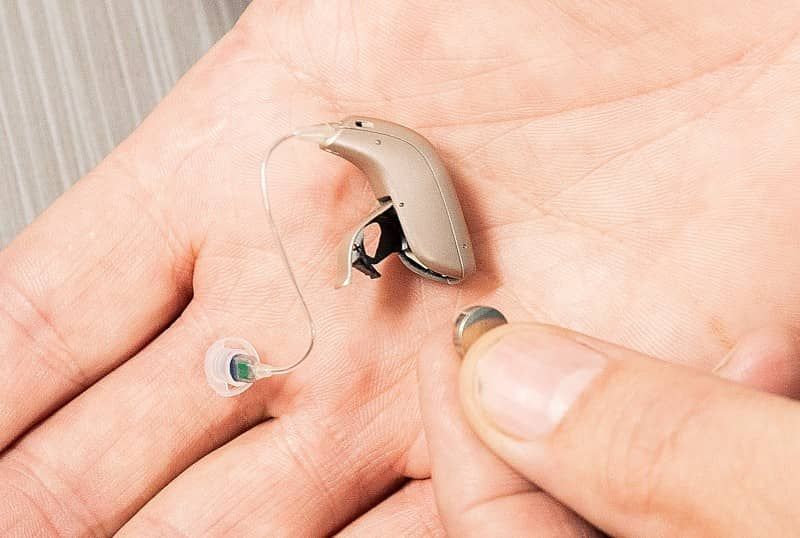
Keep them away from pets and children. Disposable hearing aid batteriesIn the past, all hearing aids used tiny button batteries to power them. Many still do, especially if you have profound hearing loss. Like rechargeable hearing aids, they have their pros and cons: Pros:
Cons:
There are four common sizes of disposable hearing aid batteries: 10, 312, 13, and 675, indicated by the colour of the sticker. The larger and more powerful the hearing aid, the larger the battery required.
Most disposable hearing aid batteries are zinc-air batteries. They “turn on” when oxygen interacts with them. Manufacturers label zinc-air batteries with a colour coded sticker. The expiry date is on the battery package. The battery is good until this date, as long as the sticker on the battery is not removed. Older hearing aids often used mercury battery cells. Most countries have now banned these cells for being poisonous. They are also harmful to the environment. How to change hearing aid batteriesSome hearing aids have a notification such as a short beeping sound once their batteries are low. Another indicator of a low battery is distorted sound or a need to turn up the volume more than usual. Switch the batteries immediately when this occurs. To avoid disruptions from expired hearing aid batteries, carry extra batteries with you. You can store them in the carrying case or pouch that accompanies your hearing aids. To use a zinc-air battery, remove the sticker from the flat and shiny positive side of the battery. Once the battery is exposed to air, the life of the battery has started. After you remove the sticker, wait at least two minutes before placing it in the hearing aid. The ideal time to wait is five minutes. Zinc-air batteries cannot be reactivated by replacing the sticker. How long do hearing aid batteries last?Depending on the size, you will need to replace disposable hearing aid batteries every few days to weeks. Hearing aid batteries can die quicker if you don't store them properly. The batteries should be kept in a cool, dry place. A hearing aid dehumidifier can also remove moisture from your hearing aid batteries, increasing the battery life. A general guideline for hearing aid battery life based on every day use is as follows:
Features like Bluetooth capability influence the running time of the hearing aid battery. Battery life is also variable based on the power of your hearing aids and hours of wear each day. If you wear your hearing aids 16 hours each day, the batteries will last anywhere between three and 22 days. Ask your hearing care professional what you can expect from your hearing aid battery. Storing hearing aid batteriesZinc-air batteries have a long shelf life. They can be stored for up to three years in a dry environment at room temperature, as long as the sticker is not removed. Always refer to the expiry date on your battery package. Do not store your hearing aid batteries in hot or humid environments, such as in a hot car. This can shorten the longevity of your battery power. Finally, avoid storing batteries in the refrigerator. Cold temperatures do not slow down the expiry period. Batteries in contact with metal objects such as keys or coins can short-circuit. Never carry individual batteries loose in a pocket, wallet or handbag. Store your batteries in your hearing aid accessory case or in the original package. Battery care tipsIf you are experiencing shortened battery life, these tips can help:
Still experiencing lower than expected battery life? Consult your hearing aid's user manual. You can also contact your hearing professional to ensure everything is working properly. How to dispose of hearing aid batteries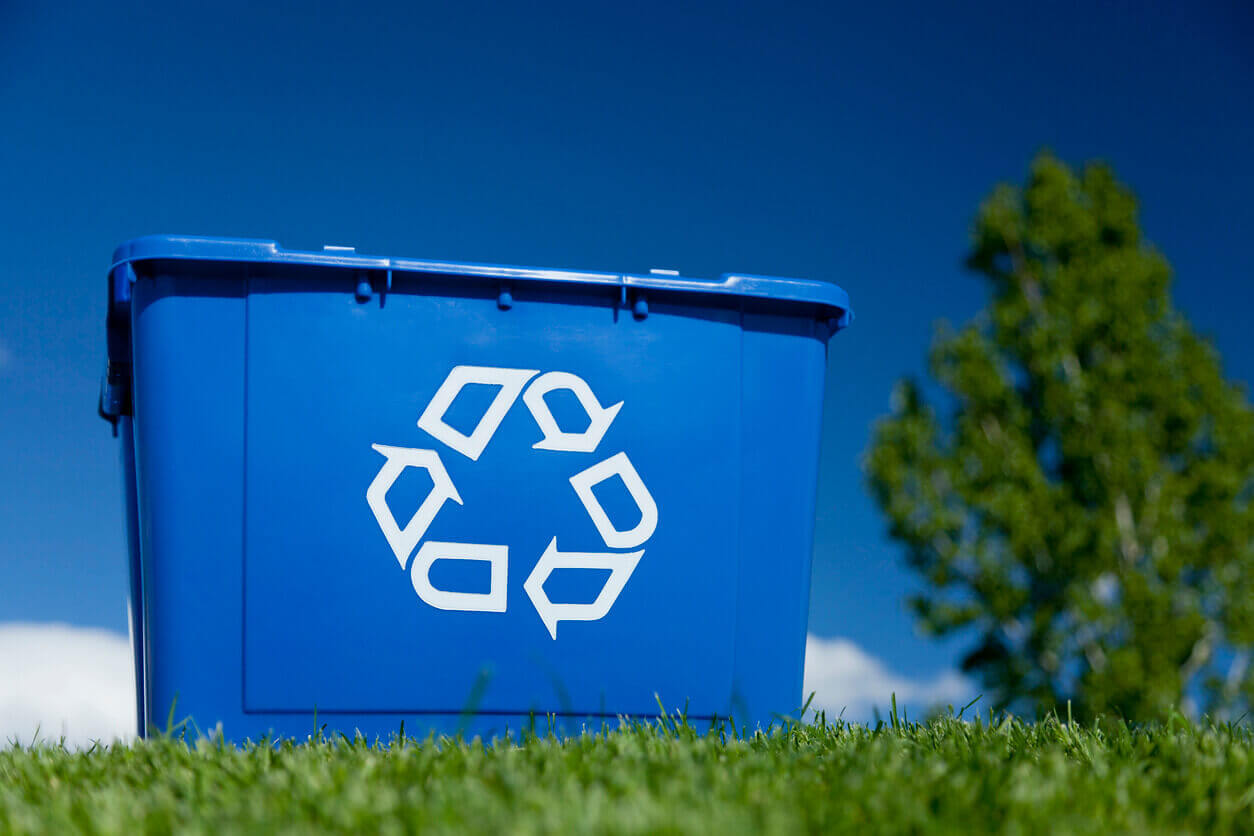
service to recycle your used batteries. Most hearing clinics have a battery disposal service to recycle your used batteries. Hearing aid batteries are toxic to people and pets if ingested. Dispose of them carefully and do not leave them where children and pets can find them. Where to buy hearing aid batteriesHearing aid batteries are available at grocery or electronic retail stores and pharmacies.You can also buy hearing aid batteries through your hearing aid clinic. Some clinics even have "battery clubs" to help you save money. Battery clubs offer discounted or free batteries as part of a warranty package. Your battery club membership also keeps information on your battery size. For hearing aid batteries in Canada, use our directory to find a hearing aid clinic near you. FAQHow long do 312 hearing aid batteries last?10 to 14 days.What is the cost of hearing aid batteries?The cost of hearing aid batteries will vary based on the pack size. An eight pack of batteries can cost around $15 to $20 CAD.Which brand of 312 hearing aid batteries last the longest?Duracell has one of the longer lasting 312 hearing aid batteries.Why does one hearing aid battery die before the other?Your hearing loss in one ear may require more amplification than in the other. The ear that requires more amplification uses more of the battery. This may cause one battery to die before the other.What is the five-minute rule for hearing aid batteries?The five-minute rule helps to extend the life of your hearing aid batteries. After you remove the sticker from the battery, wait five minutes before putting the battery in the hearing aid. This five-minute wait allows the air to activate the battery. This can add extra days to your battery life!Where do I pack hearing aid batteries when flying?You can pack hearing aid batteries in your carry-on and/or your checked bag. Though your hearing aid batteries may set off the metal detector, they will not get damaged by the detector during a security check. For more information, check with the airline you are flying with.Which brand of hearing aid batteries last the longest?This will vary based on the size of your hearing aid battery. Speak with your hearing professional for information specific to your hearing aid battery needs.
Sources Johnson, Patricia. "Updates in hearing technology." North Carolina medical journal 78.2 (2017): 104-106. Shantelle Shakes, BA (Hons)., Hearing Health Information Coordinator, Hearing Directory
You are reading about: Related topics
More information about hearing loss. Featured clinics near me
Schedule a hearing test with Healthy Hearing. Find a clinicThe Healthy Hearing Report |
|
www.HearingDirectory.ca |
Hearing aid batteries: what you need to know
By Shantelle Shakes, BA (Hons)., Hearing Health Information Coordinator, Hearing Directory Last updated on: February 28th, 2025 A look at the pros and cons of the two types of hearing aid batteries, and how to care for either type. |
 Are you located in the United States?
Are you located in the United States?

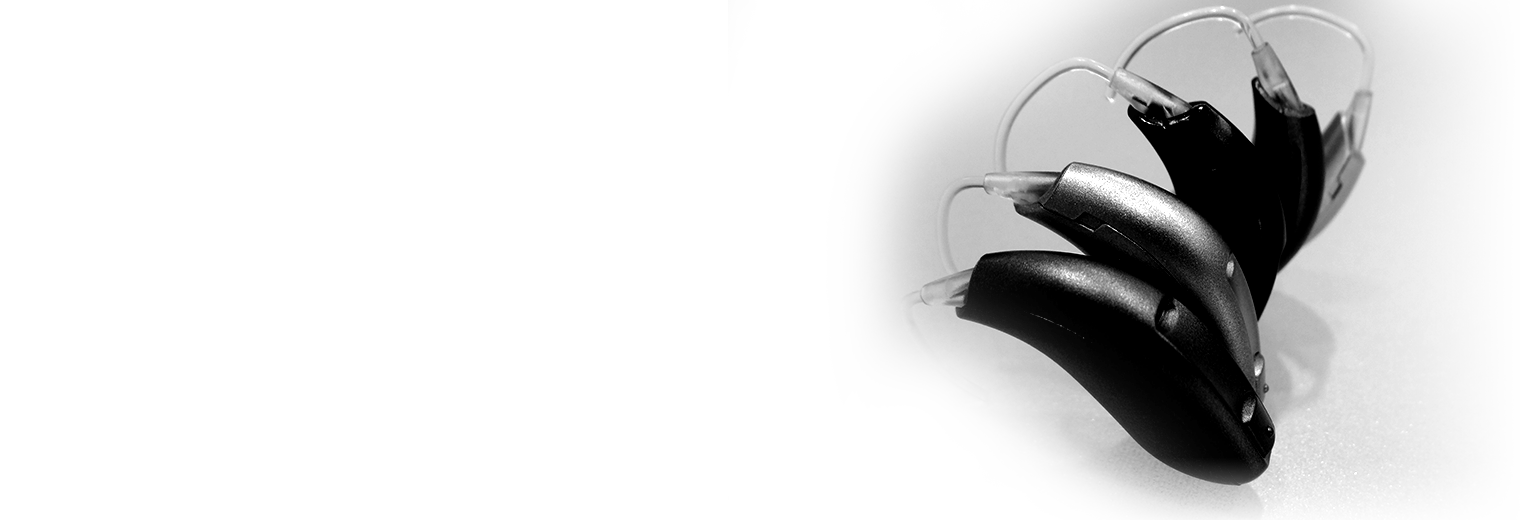
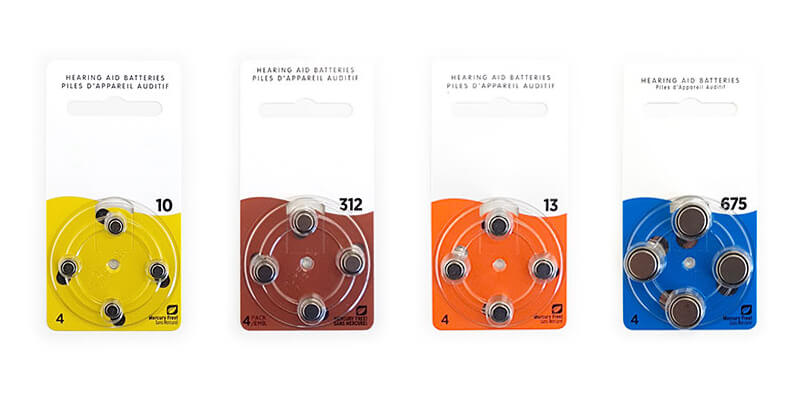
 Shantelle Shakes is the hearing health information coordinator for Hearing Directory. She has over ten years of experience in the health industry, with nine of those years in hearing healthcare. After graduating from York University with an honours BA in professional writing, minor in creative writing, Shantelle began her marketing career with a major hearing healthcare provider. Through a variety of roles within that company, Shantelle gained a thorough understanding of hearing health and the client experience. She aims to use her knowledge of the industry as well as her communications background to help others understand their hearing and connect with the hearing care they need.
Shantelle Shakes is the hearing health information coordinator for Hearing Directory. She has over ten years of experience in the health industry, with nine of those years in hearing healthcare. After graduating from York University with an honours BA in professional writing, minor in creative writing, Shantelle began her marketing career with a major hearing healthcare provider. Through a variety of roles within that company, Shantelle gained a thorough understanding of hearing health and the client experience. She aims to use her knowledge of the industry as well as her communications background to help others understand their hearing and connect with the hearing care they need.